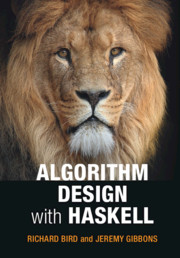
-
Select format
-
- Publisher:
- Cambridge University Press
- Publication date:
- 25 June 2020
- 09 July 2020
- ISBN:
- 9781108869041
- 9781108491617
- Dimensions:
- (247 x 174 mm)
- Weight & Pages:
- 0.93kg, 450 Pages
- Dimensions:
- Weight & Pages:
You may already have access via personal or institutional login
Book description
This book is devoted to five main principles of algorithm design: divide and conquer, greedy algorithms, thinning, dynamic programming, and exhaustive search. These principles are presented using Haskell, a purely functional language, leading to simpler explanations and shorter programs than would be obtained with imperative languages. Carefully selected examples, both new and standard, reveal the commonalities and highlight the differences between algorithms. The algorithm developments use equational reasoning where applicable, clarifying the applicability conditions and correctness arguments. Every chapter concludes with exercises (nearly 300 in total), each with complete answers, allowing the reader to consolidate their understanding and apply the techniques to a range of problems. The book serves students (both undergraduate and postgraduate), researchers, teachers, and professionals who want to know more about what goes into a good algorithm and how such algorithms can be expressed in purely functional terms.
Reviews
‘I strongly suspect that Richard Bird hides a magically productive book writing apparatus in his office. This time around, Bird pulled the machine’s levers together with Jeremy Gibbons and out came Algorithm Design with Haskell, a book that is remarkable in many ways … the authors recast a number of classical problems in terms of thinning, including ones like knapsack which otherwise have been tackled via dynamic programming for ages. These fresh – very confidently and competently presented- takes on established material are true highlights of the text.’
Torsten Grust Source: Journal of Functional Programming
Contents
Metrics
Altmetric attention score
Full text views
Full text views help Loading metrics...
Loading metrics...
* Views captured on Cambridge Core between #date#. This data will be updated every 24 hours.
Usage data cannot currently be displayed.
Accessibility standard: Unknown
Why this information is here
This section outlines the accessibility features of this content - including support for screen readers, full keyboard navigation and high-contrast display options. This may not be relevant for you.
Accessibility Information
Accessibility compliance for the PDF of this book is currently unknown and may be updated in the future.


